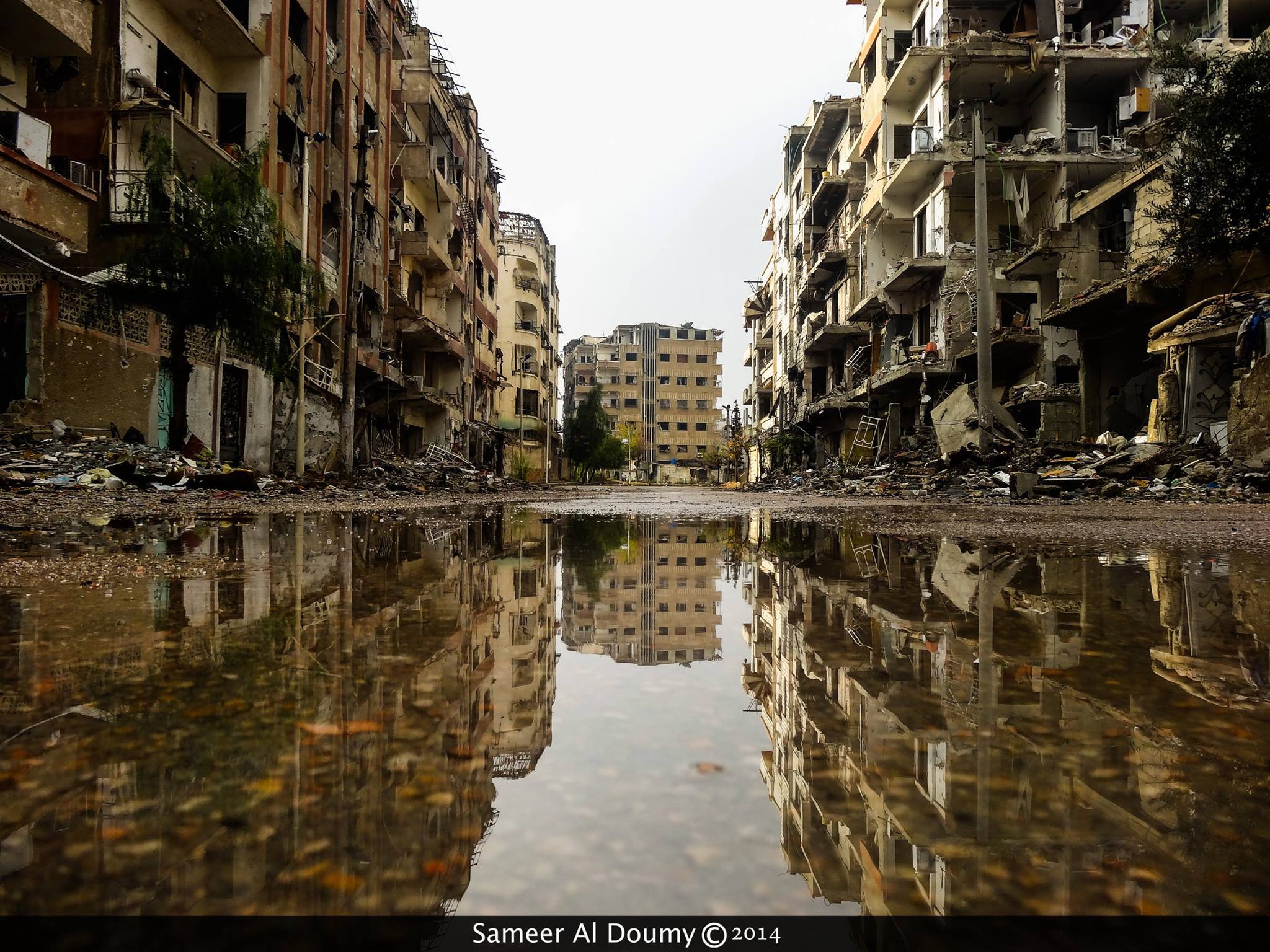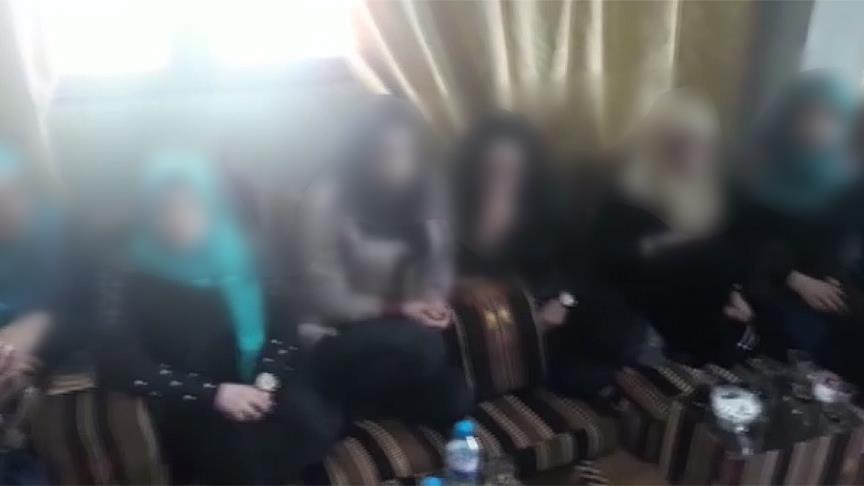 Aous al-Mubarak:
Aous al-Mubarak:
'I write this after ten days of the worst suffering I have witnessed in the last seven years. I hold my breath, as does everyone else here, and my chest is filled with sorrow due to the continuing horrors I have witnessed, as the shelling has not ceased. The shelling on civilians has decreased, but overall it has intensified and clashes continue all day, on all the fronts of Ghouta that Assad’s forces and their supporters are trying to storm.
I do not wish my readers to think I am avoiding the truth with what I say, especially after Security Council Resolution 2401, which was approved by all Security Council members including the Russian government, and after the Russian government announced a five-hour daily ceasefire to evacuate civilians in contradiction of the Security Council resolution. We have grown used to statements from major powers that contradict their actions. The reality is that we have not witnessed a ceasefire of even five minutes over the past ten days.
It is difficult for me to describe the exhaustion, the disaster and the horrors, and their cumulative effect over the past seven years, but in order to put my description of today’s reality in context, it is necessary to summarize.
The Syrian revolution began in the spring of 2011, inspired by the Arab Spring revolutions that preceded it, which sought to end tyranny and dictatorship and to give power back to the people. Peaceful protests erupted across most of Syria’s cities and villages. These protests were met by Assad, who inherited the republic’s rule from his father, with repression and killing and imprisonment and torture to death, as he refused to give any rights to the people.
Roughly a year after the start of the revolution, thousands of martyrs and tens of thousands of imprisonments later, after the regime’s lack of response to any of the demands, no matter how small, and its continuation of its brutal crackdown, protesters began to carry weapons. The revolution headed towards militarization. Radical groups, facilitated by the Assad regime, exploited this situation under the auspices of protecting civilians and the legitimate right to self-defence, obfuscating their radical agendas and pretending, rather, to take these steps out of altruism and self-sacrifice. As their forces increased in number, they flaunted their radical ideology and human rights violations, without anyone daring to defy them so as not to legitimize the regime’s indiscriminate campaign against all. For the regime never stopped bombing areas no longer under its control, targeting civilians in these areas daily.
This was the situation in most of the areas that were no longer under the regime’s control after the first three years, including East Ghouta, close to Damascus. In 2013, however, East Ghouta, experienced two major events that had a great effect on the area.
The first is the second largest chemical weapons massacre since World War II (second only to Saddam Hussein's 1988 Halabja Massacre). 1,500 were killed, most of them women and children, and tens of thousands of others injured. It was a horrific day, compared by witnesses to descriptions they have read about the Day of Judgement. The Assad regime got away unpunished after agreeing to give up the weapons. But in reality, the regime did not surrender the entirety of its chemical weapons arsenal, as it has used them tens of times since, the largest case being Khan Sheikhoun which the OPCW-UN Joint Investigative Mechanism has attributed to the Assad regime.
The second event is the siege imposed by the Assad regime on East Ghouta, which has led to starvation and cut off the supply of medication, fuel, electricity, water and other necessities, forcing residents to resort to primitive methods to meet their needs. Hundreds have died from starvation and lack of medication, in addition to the thousands that have died in the daily bombings of civilians. The siege continues today, as the regime allows few supplies to reach the area, available at prices ten times those in Damascus, and blocks goods for months on ends, making prices in Ghouta the highest in the world.
After five years, the area's 450,000 residents have forgotten what it was like not to live under siege, and children have been born who have never seen a fruit, who do not know playgrounds, electricity, or television— who do not know what it is to live in security.
Clashes have erupted between radical groups and between more moderate and more radical groups, causing East Ghouta to become divided unto itself. But the radicalism has decreased with the withering of ISIS and the dwindling of Nusra to fewer than 1,000.
I do not wish to say that all we have witnessed is horrific, as society has managed to make great strides in democratic self-governance, the most important being the election of local councils in which all, including women, can participate—something that had not occurred under the 50 years of rule by both Assads. We have also witnessed the development of many civil initiatives to reinforce the idea of human rights and societal development.
But all of this is continuously undermined by the attacks on civilians by the Assad regime. The number of dead in Ghouta has reached the tens of thousands, among them those whose requests for medical evacuation were denied by the Assad regime. Despite all the rhetoric about de-escalation and truce agreements, the regime’s crimes have never stopped. Ghouta’s residents hear the news and statements then look at their reality only to find nothing has changed.
No one believed us when we said the regime did not know anything about politics except how to regurgitate its propaganda in international fora and apply its military solution, rejecting the idea of negotiations about rights for the people. No political solution can be reached because the regime refuses to relinquish any part of its “ownership” of the country, and perhaps is unable to do so.
In a continuation of this policy, the regime launched a campaign of unparalleled brutality on Ghouta on the night of February 18, 2018. We have lived through hundreds of massacres and bombing campaigns, but we had never seen anything like this.
Every day tens of thousands of bombs and shells and barrel bombs are dropped. At any given moment, fighter jets and helicopters could begin swarming over Ghouta at any given moment, and artillery fire and rocket launchers bombing residential areas continuously. Ghouta is now completely paralyzed, and residents have been forced to seek shelter underground. The streets are deserted and stores are closed.
The jets use a type of highly explosive bomb that we have not seen before; a single one of them is capable of bringing down a six-story building. Dozens of buildings have fallen in on their occupants, and underground shelters have collapsed on women and children, the rubble crushing them to death.
The bombing surrounds us from every direction, the rockets deafen us and make us fear we are next. Something we all agree on: if it must be, make it a quick death for us and our children. Let it be a death without pain, not a slow death beneath the rubble.
Underground field hospitals are overflowing with the dead and the injured and doctors can no longer manage to work around the clock. Hospitals are continuously bombed to prevent the injured from being treated, as the regime did to the protesters in 2011, preventing them from being treated and arresting them immediately as the hospital entrance.
As for the White Helmets, they are the noblest people I have met since the beginning of the revolution. They are true heroes, rushing immediately towards bombed areas, despite the density and intensity of the bombing, to save the injured and pull victims out from under the rubble. Collapsed underground shelters are a new phenomenon for the White Helmets, but this has not stopped them from digging underground tunnels from neighboring streets to reach them.
Some of them have been martyred performing their noble duty, and their centers have not been spared the concentrated bombing that seeks to put them out of service and kill the maximum number of people possible. It is not surprising that the Assad regime and its supporters would hate them and spread lies about them. The latest of these is that they are preparing a chemical attack on civilians and plan to blame it on Assad.
Despite the great efforts by civil groups to lessen the suffering and horrors, the disaster is simply too great for its impact to be lessened by much. Many underground shelters are not equipped with bathrooms or the most basic of amenities. People spend most of their days in complete darkness, waiting for the unstoppable bombing to cease. Many of them have lost their homes in the bombing. They cannot find anything to buy outside and don't have the money required to leave the area, because they are living day-to-day, and work is very hard to come by.
Even though the bombing has lessened in the past couple of days, as it has intensified on Ghouta's front lines, which are stormed from every direction by the regime, things remain paralyzed, with no one daring to return to normal life because of the possibility of being killed in the bombing.
I want to remind everyone that there are countries fighting in Syria via their proxies in the regime and opposition, leaving civilians to pay the price; and that these same governments have apologized for the massacres their ancestors perpetrated against Native Americans, Africans, and Jews. Perhaps they expect their grandchildren to apologize for what they are doing to us today.
There is, however, a positive aspect that we must keep in mind, and that is the solidarity we have experienced from people from across the world. To all who have stood with us and stood for our freedom and dignity, we are thankful and grateful. They are also defending themselves, for a victory by the tyrannical and brutal regimes over those who called for freedom and democracy in a world poses a serious threat to the fundamental values of freedom, justice, human rights, and democracy.'





